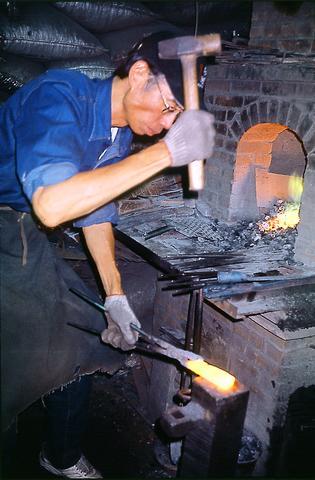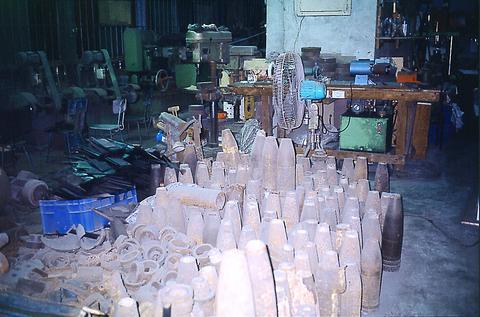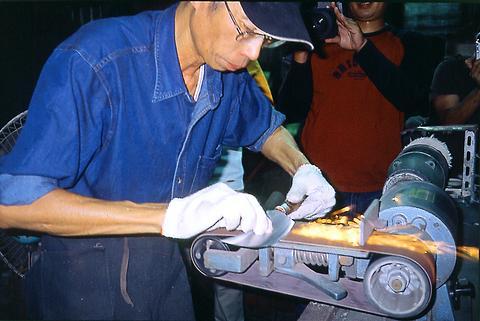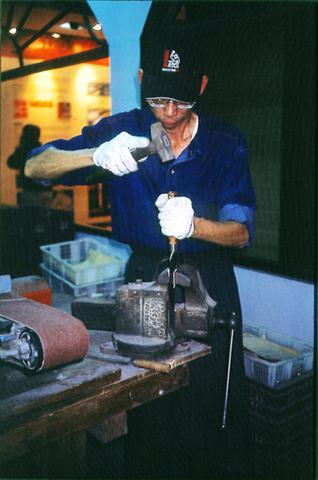In the 823 Artillery Bombardment (
What this has given Kinmen, in addition to many semi-collapsed buildings, is a huge cache of high-quality steel. In the hands of knife-maker Wu Tseng-dong (

PHOTOS: IAN BARTHOLOMEW, TAIPEI TIMES
The Chin Ho Li Steel Knife Factory (

Wu Tsong-shan, a quietly spoken bespectacled man, has spent over 30 years making knives and is the third generation of his family in the business. Wu recalled a childhood in which he would work the bellows of the forge when he got back from school, and serve as an assistant to his father and brothers around the smithy.
"In those days, production was very limited," he said. "But the knives we made were highly regarded, and would often be bought by soldiers stationed on the island and taken back to Taiwan. That's how our reputation grew."

In the early days, Wu's family made agricultural implements. Bombing of the island provided quality steel that literally dropped from the sky, and the Wu family shifted to making knives.

"Mostly we made butcher's knives. In the beginning, we would only take money after a person had used the knife and found it satisfactory. If it was unsatisfactory, we would replace it with another."
This input by Kinmen's butchers has been put to good use and now Wu's knives are definitely at the top end of the market. Sadly, perhaps, they are no longer used by local butchers, but have instead found their way into the kitchens of chefs working for major hotels in Taiwan and overseas. "Some have even provided specific designs for us," Wu said, "and we are gaining experience of their habits and needs."
While Wu does not claim any analytical knowledge of the materials he uses, his long familiarity with his materials has made him an expert in the subtle art of forging steel. "We must judge the heat of the steel very accurately. The color [of the red hot] steel tells us what we need to know ... this is part of the secret knowledge of our business," he said, with a mixture of pride and self-deprecation. "It all has to be judged very accurately."
Certainly, part of the appeal of Kinmen knives is in their association with history, but they would certainly not be so popular if they were not also of outstanding quality. The secret is in the fact that these knives are still forged and shaped by hand. "There is no comparison with mass-produced knives that are simply cut and ground from a metal board," he said. "It is the forging process that gives these knives their hardness and their ability to hold an edge."
The government has played a part in raising the profile of Kinmen knives. Since 1998 it has provided guidance about designing Western style knives and in 2000 assisted with a total revamp of labeling and packaging.
These days, "Maestro Wu" knives come in elegant display boxes and Wu says that they are increasingly developing extra-high-end knives for collectors.
"After all, one kitchen only needs a few knives, and our knives last a long time, so we have to expand the market in new directions."

In the March 9 edition of the Taipei Times a piece by Ninon Godefroy ran with the headine “The quiet, gentle rhythm of Taiwan.” It started with the line “Taiwan is a small, humble place. There is no Eiffel Tower, no pyramids — no singular attraction that draws the world’s attention.” I laughed out loud at that. This was out of no disrespect for the author or the piece, which made some interesting analogies and good points about how both Din Tai Fung’s and Taiwan Semiconductor Manufacturing Co’s (TSMC, 台積電) meticulous attention to detail and quality are not quite up to

April 21 to April 27 Hsieh Er’s (謝娥) political fortunes were rising fast after she got out of jail and joined the Chinese Nationalist Party (KMT) in December 1945. Not only did she hold key positions in various committees, she was elected the only woman on the Taipei City Council and headed to Nanjing in 1946 as the sole Taiwanese female representative to the National Constituent Assembly. With the support of first lady Soong May-ling (宋美齡), she started the Taipei Women’s Association and Taiwan Provincial Women’s Association, where she

Chinese Nationalist Party (KMT) Chairman Eric Chu (朱立倫) hatched a bold plan to charge forward and seize the initiative when he held a protest in front of the Taipei City Prosecutors’ Office. Though risky, because illegal, its success would help tackle at least six problems facing both himself and the KMT. What he did not see coming was Taipei Mayor Chiang Wan-an (將萬安) tripping him up out of the gate. In spite of Chu being the most consequential and successful KMT chairman since the early 2010s — arguably saving the party from financial ruin and restoring its electoral viability —

It is one of the more remarkable facts of Taiwan history that it was never occupied or claimed by any of the numerous kingdoms of southern China — Han or otherwise — that lay just across the water from it. None of their brilliant ministers ever discovered that Taiwan was a “core interest” of the state whose annexation was “inevitable.” As Paul Kua notes in an excellent monograph laying out how the Portuguese gave Taiwan the name “Formosa,” the first Europeans to express an interest in occupying Taiwan were the Spanish. Tonio Andrade in his seminal work, How Taiwan Became Chinese,